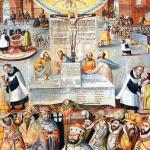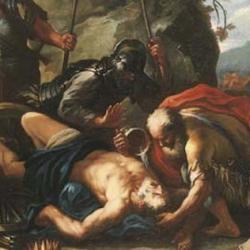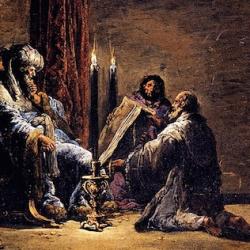Protestants often focus on the doctrinal issues of the Reformation, but right teaching about justification wasn’t the only issue at stake. The question was, Who is the bearer of Jesus’ kingdom? Or, Which church is the true church? That just raises the further question, What are the marks of the church?
Abijah’s pre-battle speech in 2 Chronicles 13 gives us some insight. He is trash-talking Jeroboam and his troops, but he lays out a vision of Israel focused on submission to the Davidic kingdom and maintenance of true priestly worship. It’s the second part of the speech that interests us.
Abijah’s premise is that Israel exists to be an effective sign of Yahweh’s kingdom on earth. The armies of the Davidic kings are the earthly hosts of Yahweh of hosts; the wars of David are Yahweh’s wars. David’s kingdom is an effective sign of Yahweh’s kingdom because Yahweh is enthroned in Jerusalem, the chosen city, in His house, the temple, and is attended by the Levitical priests.
You can see that Judah is the true kingdom of Yahweh on earth. It’s empirically verifiable, because Judah alone has the right priests who do the right things in the temple.
Of course, Jeroboam has his shrines and his priests, but they don’t qualify. Jeroboam allows anyone who comes with a bull and seven rams to “fill his hand” for priesthood. We’re back in the time of the judges, when anyone would “fill the hand” to serve as priest, so long as someone “filled his hand” with money. Jeroboam has priests, but they’re not sons of Aaron.
Besides, the calves that Jeroboam’s priests serve as made gods (v. 8). And a made god is a no-god. Abijah is darkly sarcastic here. Men scramble to Bethel with a bull and seven rams, a hefty payment, for the privilege of getting a post to serve . . . nothing at all! Jeroboam’s priests stand to serve the void.
No wonder Abijah can speak so boldly from a mountain overlooking Bethel. He can insult the golden calves and their priests to his heart’s content. After all, what are they going to do? They are no-things!
Judah is visibly different. Yahweh is Judah’s God (v. 10), since they have not forsaken Him. Israel has forsaken Him (v. 11). And when Israel forsook Yahweh, Yahweh forsook them.
And the sign of Yahweh’s continuing presence among the people of Judah is the continuing round of temple service carried out by the sons of Aaron. In seven (!) clauses, Abijah summarizes the work of the temple: ministering to Yahweh, Levites attend to their work, morning and evening ascensions in smoke, morning and evening incense, showbread set on the table, the golden lamps prepared and lit, doing guard duty of the house of Yahweh.
What are the marks of the true Israel? Not merely right belief, but right worship. Not merely worship with right hearts, but public worship that visibly conforms to Yahweh’s commandments. To repeat, it’s possible to see that Judah is the true Israel.
The Reformers made similar claims. Despite popular distortions, liturgical concerns and the shape of Christian ministry were great of immense importance to Luther, Calvin, Zwingli, Bucer and all the rest.
They didn’t consider forms and orders of worship indifferent. They charged that the Catholics had corrupted the worship of God. They had introduced relics and venerations; they denied the cup to the laity; they enslaved the Mass to their false teaching about Eucharistic sacrifice and real presence.
The Reformers didn’t just teach the right things about worship. They claimed to practice right worship.
Luther and Calvin could have stood with Abijah to trash-talk the Catholics about the ministry to. They didn’t ignore the question, Who has the true ministry? They answered by saying, We do.
The Reformers charged that Catholic priests couldn’t teach the word of God, didn’t provide pastoral guidance, didn’t live holy lives. They failed to be what pastors are supposed to be – ministers of the word, shepherds, moral examples. The Reformation was a reformation of the Christian ministry, and provoked a needed reformation within the Catholic church.
In short, the Reformers claimed that they had the right form of worship and the correct shape of ministry. And they were quite biblical to focus on these “externals.” As Abijah’s speech indicates, this is the distinction between the true kingdom of God and its counterfeit.
Claiming that the Reformation has a more biblical form of worship and ministry than the Catholic church: This shouldn’t produce pride or complacency. The remainder of 2 Chronicles recounts how often and deeply Judah failed to live up to the pattern Abijah describes.
Abijah charges that Jeroboam is a rebel and that Israel is founded on rebellion. Soon enough Judah will rebel (2 Chronicles 36:13, same verb that Abijah uses) against Lord’s chosen king, Nebuchadnezzar.
Judah has the right priesthood and the right form of worship. But over and over Judah abandon the Lord’s house. Jerusalem the chosen city houses a temple to Baal. Ahaz copies the worship of the Arameans. Manasseh places Baals and other idols before the face of God in the temple.
Even good kings abuse the temple. Asa takes gold from the temple to manipulate geo-political circumstances. Uzziah tries to offer incense in the temple. The fact that Judah has the true priesthood and true worship doesn’t guarantee that she will maintain faithful worship forever.
Abijah’s speech also doesn’t imply that the northern kingdom is hopeless. After the Assyrians conquer the north, Hezekiah invites the remnant of Israel to join a great Passover. When Josiah discovers the law in the temple, he purges Judah and Jerusalem of idols, and carries out his purge into the northern kingdom. The counterfeit, rebellious kingdom of Israel is eventually reincorporated into Judah.
Abijah’s speech gives the right balance in our celebration of the Reformation. We can affirm the rightness of the Reformation: It is not a rebellion but a restoration of true ministry and worship, as well as true doctrine.
At the same time, Judah’s history serves as a warning against complacent triumphalism. And it gives us hope that someday, albeit in the grave of exile, Judah and Israel will be reunited to worship the true God.











